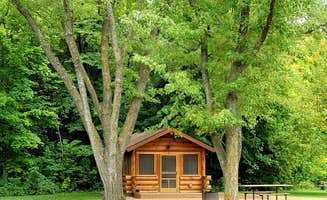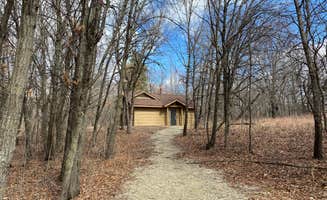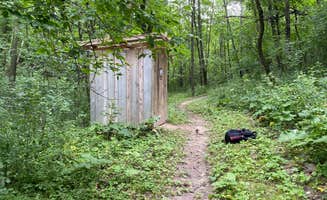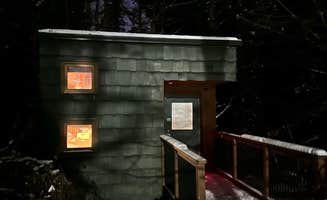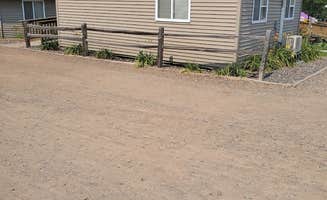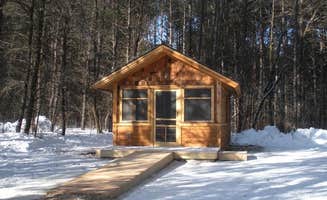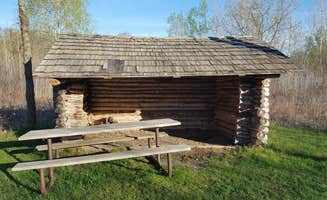Cabin camping near Long Lake, Minnesota provides access to diverse wooded settings within 20 miles of the Twin Cities metropolitan area. Elevations in this region generally range from 900-1,100 feet above sea level, creating varying terrain between lakeshores and bluffs. Seasonal mosquito populations peak from June through August, with horseflie activity increasing near woodland water features during summer months.
What to do
Trail exploration: 11+ miles of paved paths circle the lakes at Baker Campground - Baker Park Reserve, allowing for extended bike rides regardless of weather conditions. "There are nice paved trails around a couple of lakes/ponds for biking, and easy access to the shower and bathroom facilities," notes a camper who spent two nights at the park.
Winter recreation: snowshoeing and skiing trails remain accessible during colder months at Lake Maria State Park Campground. The park maintains groomed trails when snow conditions permit. "I visit here often, great walking trails and wildlife," shares a regular visitor who appreciates the year-round access.
Swimming beaches: two separate locations serve different user groups at Baker Park Reserve. "There are 2 swimming beaches: 1 for the campground and one for all of the day visitors," explains a reviewer. The park also offers equipment rentals including "canoes, paddle boats and SUP boards" for water activities.
What campers like
Privacy levels: sites at both ends of spectrum provide options based on preferences. At Crow Hassan Park Reserve, the Riverbend group equestrian campground offers nicely maintained spaces with "mature trees that a lot of people set up hammocks in." For those seeking more seclusion, Lake Maria provides backpack sites "nearly surrounded by a lake."
Site spacing: varies significantly between properties across the region. A camper at Minneapolis Northwest KOA appreciated that "the sites are stacked on top of each other, but there is a pool and a cute little camp store." This contrasts with Bunker Hills Regional Park where sites are described as "big with privacy between the camp spots."
Storage solutions: interior organization options differ between cabin styles. One camper at Rice Creek notes some cabins include "level private sites, lots of trees," while another pointed out that "tent pad is level, and there's a solid fire ring and picnic table" at a backcountry site.
What you should know
Handicap accessibility: varies by location with some paths offering better options. The campgrounds typically maintain at least portions of their facilities for wheelchairs, though backcountry sites often require traversing uneven terrain.
Reservation timing: popular cabins fill quickly during prime months. Bunker Hills cabins have specific requirements, with a camper noting: "Based on the lack of Dyrt reviews and the overabundance of weekend availability for this campground, it might be a nice option for you to get camping even if you are a state-park-loving metro dweller like me."
Bug intensity: prepare for seasonal variations in insect populations. At Rice Creek Campgrounds, one visitor warned about horseflies making "it known that we were trespassing on their turf," particularly in heavily wooded areas during summer months.
Tips for camping with families
Beach activities: waterpark features provide structured swimming options at several locations. Bunker Hills Regional Park includes what one camper calls "a water park with a wave pool," making it particularly popular for families with children seeking more than natural swimming holes.
Playground access: multiple play areas distributed throughout some parks offer entertainment options. "There are several playgrounds, archery, an event center, frisbee golf, and yes a campground," shares a visitor about the diverse family-friendly amenities at Bunker Hills Regional Park.
Site selection strategy: evaluate walking distances for younger children. When staying at Baker Park Reserve, one camper advises that "with great fishing, playground, swimming, and biking trails very nearby, the kids were kept as busy as they wanted to be."
Tips from RVers
Leveling challenges: site topography varies between loops at many campgrounds. At Minneapolis Southwest KOA, a visitor reported that "the site was very unlevel and the water spigot didn't really work very well."
Campsite privacy: RV sections often more exposed than tent-only areas. The tent-only F Loop at Rice Creek Campgrounds means "no generators! It was very quiet!" according to one camper, who contrasted this with RV areas where spacing between sites diminishes privacy.
Electrical hookup placement: check outlet locations when booking cabin sites. Some cabins position electrical outlets away from bed areas, making device charging less convenient during overnight stays.


